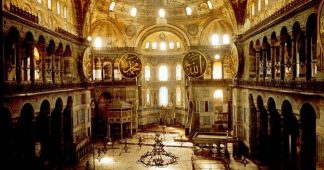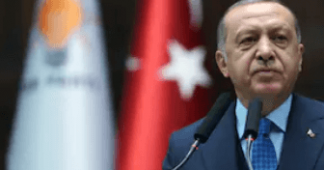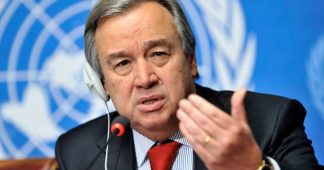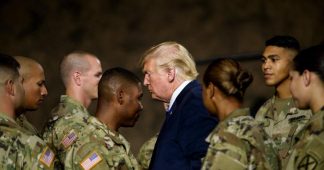By Yangos Andreadis*
The Covid19 pandemic has ceased to be an exclusively sanitary crisis. It clearly has important political and cultural aspects and we may say it makes part of the global World Crisis. It includes antagonism and exchange of accusations between states, racial discrimination, serious civil violence etc. In the previous article dealing with the pandemic I have expressed the opinion that this is connected with the fact that at the end of the second decade of the 21st century we are witnessing the continuous decline of a good part of the world leadership- a central component of the Crisis in question: This does not concern just the health system. With very few exceptions, several leaders of great powers of the planet demonstrate the same incapacity to foresee, while they compulsively repeat the same deeds that have brought the planet closer to misery and destruction. Luck of imagination, platitude of rhetoric, incapacity to plan at the level of strategy and tactics are some of the symptoms of such political decline. This does not mean that world leaders are unwilling or incapable of taking decisions. Yet, such decisions are too often disastrous for humanity.
Wars, the threat of wars and the exploitation of wars as a means to dominate and plunder, are among the things that World leaderships are able of doing. Wars are in fact among their favorite contemporary occupations considering that the first decades of the present century are suffering from interminable armed and other violent clashes of all kinds: Wars between .states, wars conducted through go-betweens like the Talibans or I.S.I.S. or civil wars often fomented by foreign powers, . Aggressiveness inspired or exploited by leaderships serves to canalize the discontent of the oppressed against the others serving as scapegoats.
The Middle East, including Iraq, Libya and the South East Mediterranean has probably the privilege to be the center number one of armed conflicts, including armed western interventions often justified by the evocation of human rights, presumably the rights of the populations massacred during such “humanist” invasions. This same area happens to be the cradle of some of the greatest human cultures: Those of Mesopotamia, Egypt, Greece, Rome, Byzantium and the Arab world. The horrific destruction of a great part of the patrimony of such cultures can be instructive: The plunder of the treasures of Iraq, victim of the invasion of the Americans and their allies, the destructions of ancient monuments in Syria, Lebanon etc., the plunder of church wall paintings in Cyprus after the Turkish invasion of 1974, the destruction of Palmyra and the killing of local archeologists by the ISIS, the destruction of byzantine and post byzantine churches in Kosovo, and last but not least the fate of Hagia Sophia, testify both the glory of such civilizations and the criminal contempt or the indifference expressed by several people in power on their regard. The qualitative and economic decline of the UNESCO, itself a necessary consequence of the general decline of the United Nations Organization, has contributed to the fact that such crimes have remained practically ignored and unsanctioned. Needless to add that the destruction of the world patrimony is not the only damage suffered by humanity: Loss of so many human lives, environmental disasters, oppression and exploitation, abolition of democratic values, very often in the name of democracy, are included in the list of crimes committed against humanity in this and other areas.
Greece makes part of the political and military map of East Mediterranean. Since 1821 a national revolution has led to the creation of an independent state where one sixth of all Greeks lived. The effort to liberate the rest of Greek inhabited territories has led to the successful war against Turkey 1912, but also to the disaster of 1922. Greece has experienced the dependence from on various Western powers and has suffered more foreign occupations -English, French during the 19th century war of Crimea and the 1st World war, German, Italian, Bulgarian during the 2nd – as well as the 1967 dictatorship imposed by the USA that has led to the Turkish invasion of Cyprus. The country is nowadays striving to face the dramatic consequences of the world crisis and the memorandums imposed by E.U. and the I.M.F. as well as the problems with neighboring countries: Those with Albania, although serious enough, do not for the moment constitute a direct threat for Greece’s territorial integrity. The Macedonian conflict between Athens and Skopje has up to an extent been settled with the 2018 Prespa Agreement. Contrary to this, the Eastern frontiers of the country face a constant and increasing threat from Turkey.
During this last period Turkey has clearly become the main factor of conflicts in the Mediterranean: Millions of Kurds living within in this country’s borders suffer violent oppression, while those in Syria and in Iraq are constant object of military aggressions, as Turkey considers its right to invade other counties in the name of fight against terrorism. Turkish forces are operating -directly and/or through go- between- in Libya, while Greece and Cyprus face constantly multiple threats, including verbal and armed intimidation, diplomatic movements undermining their sovereignty. To these, should be added the use of the refugees in the Aegean islands and Thrace as a tool of asymmetrical aggression against Greece, the economic blackmail against E.U. and the recent conversion of Hagia Sophia into a mosque.
The fact that U.S.A., E.U. and Russia tolerate for various reasons Turkish aggressiveness is currently interpreted by geopolitical and/ or economic considerations. However, what remains ignored or underestimated is the cultural dimension combined with politics. Erdogan’s strategy has common points with that of his predecessors, yet differs considerably concerning crucial points. The policy of previous Turkish leaders also contained ambitious plans overlapping Turkish borders. Erdogan follows the same strategy but with a crucial difference, justifying a posteriori Huntington’s ominous prophesies: What he tries to promote is not Turgut Ozal’s plan to associate Turkic* nations in a kind of league. What he is aspiring to, is to establish under his leadership something vaster and much more threatening: The religious/political union, potentially comprising Muslims all over the world, amounting to more than a million and a half. The goal of the revival of the Ottoman Empire, through a reconquista of the lands once conquered by the Turkish sword, an idea diachronically dear to more candidate invaders, is complementary to his larger objective. To achieve this, he uses very often violence or intimidation, in the Near East, the Mediterranean, the South of Europe, Africa and Asia, intervening in more senses in a long series of states. Numerical facts are not however sufficient in order to estimate how dangerous this is if we ignore another factor: A good part of Islam has today lost in spirituality what it has acquired in fanaticism and brutality. The Taliban and the I.S.I.S. constitute an irrefutable proof that what was once sacred tends to become more and more profane, impious and criminal. The presence of Taliban at Hagia Sophia and Erdogan’s connivance with the ISIS illustrate the kind of danger he represents for Humanity: A danger understood better by some Arabic states like Egypt, who has strived, with considerable sacrifices, to establish political Islam.
Greece remains the main target of Erdogan’s aggressiveness. The Aegean, Thrace, the Greek Exclusive Economic Zone are just part of his objectives. What he really wants is to humiliate, downgrade and subjugate Greece, in order to serve his ambitions surpassing the role of a regional power in the Mediterranean and the Middle East. The range of such ambitions explains why more countries, including France, Egypt, Jordan, Saudi Arabia and Arabic Emirates, Cyprus and Israel, have recently expressed concern and/or objections regarding his policy. These countries do not however share the same interests and plans and are not going to react similarly in future either in case of an eventual Turkish aggression against Greece or in other occasions. Plans of political rapprochement and/or economic cooperation do not count much if they are not followed by concrete acts. Greeks must therefore analyze realistically the situation taking the necessary steps in their effort to discourage aggression or face it in case in becomes effective.
Culture is not able to face tanks, warships, or the S400. It remains however important – among others- in the field of defense, because it constitutes the essence of every nation’s psyche. However, some aspects of cultural life in Greece seem to contribute rather to the discouragement and disorientation of the people that will eventually be called to defend the Greek frontiers. Next year 2021 will mark the bicentenary of the Greek Revolution of 1821 against the Turks. The present Greek Government has appointed as president of the Organizing Comity that will organize the celebrations Mrs. Yanna Anghelopoulou, who in 2004 has had the general responsibility of the unsuccessful Olympic Games of Athens. The committee she has now organized has declared in many occasions that its basic objective is to underline two points: a) The fact that, according to them, Greek national identity – being previously inexistent- was “constructed” – at the time of the 1821 revolution and b) The crimes committed by Greek revolutionaries. We will have the occasion to comment on both of those points in the third part of this paper. But we must state already that they are both inspired by the care to please the international post modernist globalized trend of ideas supporting the abolition of all states except the few dominant ones. What such people seem to ignore, intentionally or not, is that the Greek revolution was the first step to abolish Turkish dominion in South Eastern Europe and more generally the dismantlement of the Ottoman Empire, which now Erdogan dreams to resurrect. Speaking in a broader sense, commemorating the 1821 Revolution means confirming the right of mankind to revolt against tyrannia, the term Greek tragedians and orators used to denounce, absolutism and oppression, a right which is now contested by autocrats, oppressors and revisionists around the world. One must admit that the emergence of this current of revisionist thought regarding the Greek identity and historical past dates from several decades, yet the present government, necessarily defending the country from neo-ottoman aggression, seems unaware of what such opinions mean. Turkish aggressiveness has somehow rendered more difficult this revisionist task, but a serious answer to its assertions is urgently needed.
*Turkic must be distinguished from Turkish. It denotes a collection of distinct ethnic groups- among which Uzbeks, Kazakhs, Uyghur’s, Turkmens, Tatars etc.- descending from North East- Asia and speaking Turkic languages.
* Yangos Andreadis is professor emeritus at Panteion University, Athens. He has been chair of the Communication, Media and Culture Department in this University. He has also been President of the Artistic Comity of the National Theatre of Greece and member of the International Council of the Theatrical Center of the U.N.E.S.C.O. He has inaugurated the Greek Chair of Culture, Language and Literature at Jawaharlal Nehru University, New Delhi, and he founded the Centre of Classical Drama. He studies, writes and directs theatre with an emphasis on Ancient Drama, and is also active in several literary fields as well as in visual and performing Arts. He was co-founder of the 20th of October Movement against the Junta and, although constantly politically active, has never been member of any political party.











